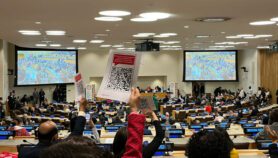Send to a friend
The details you provide on this page will not be used to send unsolicited email, and will not be sold to a 3rd party. See privacy policy.
Flaws in a clinical trial of the AIDS drug nevirapine conducted by the US National Institutes of Health (NIH) were reportedly kept from the US president before his 2002 announcement of a major aid programme for Africa. Nevirapine was the programme’s centrepiece. An NIH official says a review of the study, which was conducted in Uganda, suggests the drug should not be used if other options are available.
According to documents obtained by the Associated Press news agency, NIH officials failed to report concerns over the safety of the drug. The concerns about the trial were serious enough to warrant the drug’s manufacturer to withdraw a request to use it to protect babies in the United States. Less than one month after the announcement of the US plan to spend US$500 million to supply the drug in Africa, Ugandan officials were told that the NIH research had violated US patient protection rules. The US Office of Human Research Protections said the trials might not have minimised the risks run by patients in the study.
Research has shown that a single dose of the drug has potential to stop transmission of the HIV virus from mothers to their children. The side effects, however, can be life-threatening; 14 deaths and many adverse reactions to the drug during the NIH study were not reported in the study’s database.Read more about this subject in SciDev.Net’s spotlight on Mother-to-Child Transmission.













